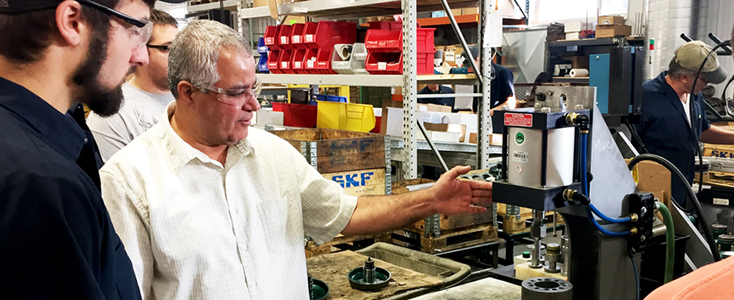In 2015, Cedar Summit Farm in New Prague closed its doors. It was the only certified 100 percent grass-fed dairy producer in the state. Kendra Rasmusson, originally from the New Prague area, had recently moved back to the area from the Twin Cities with her husband Paul. They were seeking a place with a stronger sense of community where they could raise their family. The closing of Cedar Summit Farm prompted the Rasmussons to start exploring if this was an opportunity to open their own local foods market.
“I’d always known that I’d be a small business owner, it was just a question of when,” said Rasmusson. In October of 2015, they opened Farmhouse Market on New Prague’s main street.
“This is the type of innovation critical to our rural economies moving forward.” —PAM BISHOP, VICE PRESIDENT OF ECONOMIC DEVELOPMENT, SOUTHERN MINNESOTA INITIATIVE FOUNDATION
Farmhouse Market is not your typical grocery store. “At first, we started thinking about opening a traditional grocery store that would carry local and organic produce, which, based on a marketing analysis survey, we knew there was a demand,” said Rasmusson. “However, the survey also indicated that more than anything else, people wanted a store that offered convenient hours.”

Ultimately, they found inspiration from the 24/7 workout facility model. By creating a member-based store where all members receive a key fob, members can grocery shop whenever they need to. “I could see this store model replicated in other rural communities, tailored to whatever the needs of that particular community are,” said Rasmusson. “Here, it was access to local and organic produce. Everywhere, though, convenience is important; people don’t want to have to drive 20 miles for a natural foods store.”
“This is an exciting business model,” said Southern Minnesota Initiative Foundation (SMIF) vice president of economic development Pam Bishop. “With many older grocery store owners retiring and an increasing demand for local food, a model like Farmhouse Market’s makes a lot of sense for new entrepreneurs looking to fill the gaps. This is the type of innovation critical to our rural economies moving forward.”
Rasmusson received a loan from SMIF’s Local Foods Loan Fund. The foundation was seeded by The McKnight Foundation in the 1980s, along with the five other Minnesota Initiative Foundations, to empower rural communities to find their own solutions to economic development needs. The Southern Minnesota Initiative Foundation provides loans as well as one-on-one technical assistance. Kendra worked with SMIF Business Specialist John Katz to set up QuickBooks to manage the cashflow and business relationships with the more than 15 local vendors she works with.
Today, Farmhouse Market has over 200 members. It carries everything from local produce and dairy products to grass-fed meats and cheeses, all-natural health and beauty products, locally roasted coffee, and gluten-free flours and mixes. Members pay with credit or debit cards using a simple self-checkout system.


